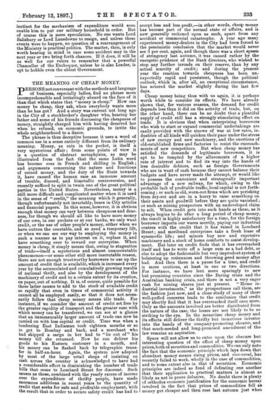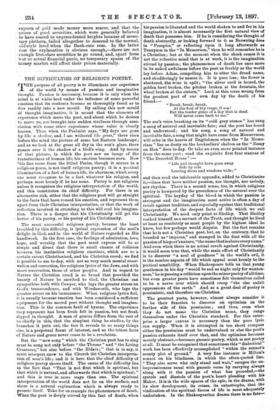THE MEANING OF CHEAP MONEY.
pERSONS not conversant with the methods and language of business, especially ladies, find no phrase more incomprehensible and irritatingly absurd on the face of it than that which states that "money is cheap." How can money be cheap, they ask, when everybody wants more than he has got P And a story was current not long ago in the City of a stockbroker's daughter who, hearing her father and some of his friends discussing the cheapness of money, straightly charged him with having deceived her when he refused, on economic grounds, to invite the whole neighbourhood to a dance.
The phrase is thus deceptive because it uses a word of common use in a sense entirely different from its ordinary meaning. Money, as coin in the pocket, is itself a very mysterious affair ; from some points of view it is a question of abstract metaphysics, as may be illustrated from the fact that the same Latin word has become saus in French and shilling in English ; and arguments concerning the nature and functions of coined money, and the duty of the State towards it, have caused the human race an immense amount of trouble, discord, and bimetallic controversies, and recently sufficed to split in twain one of the great political parties in the United States. Nevertheless, money is a still more difficult and complicated matter when it is used in the sense of "credit," the meaning which it generally, though unfortunately not invariably, bears in City articles and financial papers. In this sense, however, it is obvious enough that money can vary between cheapness and dear- ness, for though we should all like to have more money of our own, in our pockets or at our banks, we only want credit, or the use of other people's money, either when we have outrun the constable, and so need a temporary lift, or when we can see our way to employing the money in such a manner as to pay interest on it, replace it, and have something over to reward our enterprise. When money is cheap, it simply means that, owing to stagnation of trade—itself a mysterious and almost unaccountable phenomenon—or some other still more inscrutable reason, there are not enough trustworthy borrowers to use up the amount of credit that is available, which is increased every year by the accumulated and cumulatively growing results of national thrift, and also by the development of the machinery of credit and to a certain extent by its creation, on paper, out of nothing. It is, of course, quite possible for these latter causes to add to the stock of available credit so rapidly that even in times of commercial activity it cannot all be employed easily, so that it does not neces- sarily follow that cheap money means idle trade. For instance, if we consider the amount of credit set free by the greater rapidity of transport and the greater ease with which money can be transferred, we can see at a glance that an immeasurably larger amount of trade can now be carried on with less capital or credit. Time was when a lumbering East Indiaman took eighteen months or so to get to Bombay and back, and a merchant who had shipped a cargo in her had to "lie out of" his money till she returned. Now he can deliver his goods to his Eastern customer in a month, and his money can be flashed back by telegraphic trans- fer in half-an-hour. Again, the system now adopted by most of the large retail shops of insisting on cash across the counter is acknowledged to have had a. considerable effect in diminishing the number of trade bills that come to Lombard Street for discount. Such causes as these, combined with the yearly excess of income over the expenditure of thrifty people, have made enormous additions in recent years to the quantity of credit that seeks for safe and profitable employment, with the result that in order to secure safety credit has had to accept less and less profit,—in other words, cheat money has become part of the normal state of affairs, and is now generally reckoned upon as such, apart from any accident or commercial catastrophe. A year ago many experienced money-dealers in the City had been forced to the pessimistic conclusion that the market would never see 3 per cent, again, and though there was a short spasm of stringency last autumn, it was caused rather by the energetic prudence of the Bank directors, who wished to stop any further inroads on their reserve, than by any actual scarcity of credit ; and during the present year the reaction towards cheapness has been un- expectedly rapid and persistent, though the political outlook, which is, after all, an exceptional circumstance, has sobered the market slightly during the last few days.
Cheap money being thus with us again, it is perhaps worth while to consider its effects. We have already shown that, for various reasons, the demand for credit depends less than it did on the activity of trade, but, on the other hand, there can be no doubt that a plentiful supply of credit still has a strongly stimulating effect on trade. It is obvious that when enterprising borrowers who wish to start or expand commercial undertakings are easily provided with the sinews of war at low rates, in- dustries of all kinds will quicken their pace under the stress of new energy and new machinery, and the exertions of old-established firms and factories to resist the encroach- ments of new competitors. But when cheap money has satisfied the demands of legitimate borrowers, it is apt to be tempted by the allurements of a higher rate of interest and to find its way into the hands of less desirable debtors, such as foreign Governments who are in want of cash because they cannot balance their budgets and have never made the attempt, or would like to possess the convenient and strategically important advantage of a new railway, for which, owing to the probable lack of profitable traffic, local capital is not forth- coming ; or such as old, worn-out firms which are perishing from dry-rot and are in a hurry to raise something on their assets and goodwill before they are quite vanished ; or such as mining prospectors with an undeveloped claim to sell. When credit gets into such hands as these, as it always begins to do after a long period of cheap money, the result is highly satisfactory for a time, for the foreign borrower imports our wares merrily, paying our industrial centres with the credit that it has raised in Lombard Street ; and moribund enterprises take a fresh lease of spasmodic life ; and miners buy new and expensive machinery and a stock of home comforts to assist develop- ment. But later on credit finds that it has overreached itself and has to write off a large sum as a bad debt, or else to adopt the fashionable but very imprudent system of bolstering up rottenness and throwing good money aftei bad. And then there is a pause for a time, and credit is more cautious, at least in one or two directions. For instance, we have lent more sparingly to new but promising countries since the Baring crisis and the Australian banking crisis, and there is not a very eager rush for mining shares just at present. " Home in- dustrial investments," as the prospectuses call them, are the fashion just now, and a close study of many of these well-puffed concerns leads to the conclusion that credit may shortly find that it has overreached itself once more. Only as the amounts involved are better distributed from the nature of the case, the losses are not likely to be so striking to the eye. In the meantime cheap money and its effects still deliver the thrifty but incautious investor into the hands of the company-promoting shearer, and that much-needed and long-promised amendment of the law remains an aspiration. Space will not allow us to enter upon the obscure but interesting question of the effect of cheap money upon prices,both a securities and commodities. We can only note the fact that the economic principle which lays down that abundant money means rising prices, and vice-versa, has recently failed to work, wholly in the case of commodities, and to some extent also in that of securities. Economic principles are indeed so fond of defeating one another that their application to practical matters is almost as likely as not to prove delusive. No doubt there is plenty of orthodox economic justification for the economic heresy involved in the fact that prices of commodities fell as money got cheaper and then rose last autumn just when
exportk of gold made money more scarce, and that the • prices of good securities, which were generally believed to have soared to unprecedented heights because of mone- tary plethora, failed altogether to descend to the normal, old-style level when the Bank-rate rose. In the latter cage the explanation is obvious enough,—there are not enough first-class securities to go round, and, apart from ar or actual financial panic, no temporary spasm of the money market will affect their prices materially.



































 Previous page
Previous page